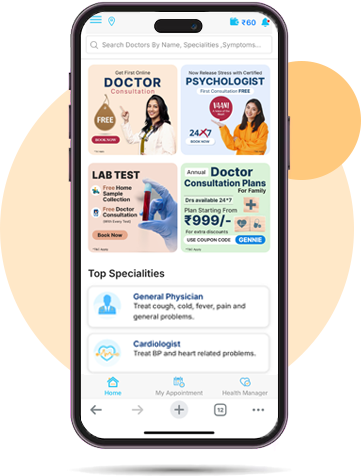Tips for Students on the Road to Success
November 18 , 2024

Motivation is crucial for achieving success in life. Especially for students, motivation is a force that encourages them to fight difficulties and work hard continuously towards achieving their goals. Motivation is the power that gives strength to move forward even in difficult times and acts as a light on the path to success. Health Gennie Student Online Health and Wellness Center brings an exciting article that educates you on building Motivation and achieving success.
1. What is Motivation?
Motivation means the inner desire and energy to do a task. It is a psychological process that motivates a person to move towards achieving a particular goal. When students focus on studying, keeping their future goals in mind, their motivation keeps them engaged in hard work and discipline. Student life is not only a time for learning but also an opportunity to develop life values and habits. When students are motivated, they can excel in every aspect of their lives.
2. The Importance of Motivation for Students
Motivation is not just a theoretical concept but a practical tool that helps students overcome academic stress, pressure, failure, lack of confidence, and other obstacles. It boosts their self-confidence and self-reliance, enabling them to face every challenge head-on. Motivation takes various forms in a student's life:
- Positive thinking: Motivation isn't just an energy; it's a way of thinking. It empowers students to think positively, enabling them to find solutions to problems and see opportunities in challenges.
- Goal Setting: Motivation helps students identify their goals and find ways to achieve them.
- Persistent Effort: When motivated, students continue their efforts despite obstacles.
3. How to Get Inspiration?
There are many ways for students to get motivated. Some of the productive ways are listed below:
(i) Take Inspiration From Successful People
Great people's life stories and success stories inspire students. These stories show how they overcame difficult situations and reached their destinations.
(ii) Maintain a Positive Environment
Spending time with positive people and reading good literature can be good sources of motivation. Students can maintain their energy by staying away from negative thoughts and people.
(iii) Set Small Goals
Setting and gradually achieving small goals is not just a strategy; it's a confidence booster. This approach builds confidence in students and keeps them motivated to reach their final goal, one step at a time.
- Make short—and long-term goals: Initially, small goals are more accessible and build confidence. After this, set long-term goals.
- Please write down your goals: Write down your goals in a diary and repeat them from time to time. This will help them settle firmly in your mind.
(iv) Celebrate Successes
Acknowledging and celebrating small efforts and successes is inspiring. This gives the students a sense of self-satisfaction about their efforts and keeps them motivated to reach their next goal. Rewarding yourself for your achievements boosts your morale and acknowledges your efforts. Rewarding yourself for your accomplishments and successes reinforces your motivation and makes you feel appreciated and productive for your hard work and efforts.
- Reward yourself: Give yourself some rewards for small successes. This increases your motivation even more.
(v) Interact With Friends and Mentors
Your friends and teachers/gurus are always ready to give guidance. You can also Book Doctor Consultation Online at Health Gennie and talk to a Psychologist for professional advice. Their experience not only helps you learn but also boosts your morale. Interacting with them can provide valuable insights and support, making your journey more manageable and less daunting.
- Study in groups: Sometimes, studying in groups increases one's knowledge of the subject and provides motivation. However, make sure that the group environment is conducive to study.
(vi) Maintain a Positive Attitude
- Use affirmations: Repeating positive statements daily (e.g., “I can do it,” “I will work hard”) helps build self-confidence.
For instance, you can express gratitude for having the opportunity to study or for the support of your family and friends. Expressing gratitude significantly impacts your attitude and helps you keep a positive attitude towards life and goals.
- Bring positivity into daily habits.
Regularity: Waking up on time, setting a time to study, and planning everything—these habits help keep your motivation up.
Take care of your health: Proper diet, adequate sleep, and regular exercise are vital for motivation and energy. If the body is healthy, the mind will also remain motivated.
(vii) Manage Your Time Properly
Effective time management can significantly increase motivation. Completing your work on time brings peace of mind and boosts your confidence. Learn practical time management skills from Best Psychologist in India. Give priority to work. Do meaningful work first. It will save you time and increase your focus on your studies.
(viii) Embrace Change
Change the place, time, or studying technique to change the study environment. For example, sometimes, study in an open space or a garden.
- Learn new things: Learning something new every day keeps the motivation high. Interest in new subjects increases, and enthusiasm remains.
(ix)Take Breaks And Rest Yourself
Continuous study can cause fatigue. Taking a little rest every one or two hours keeps the mind fresh.
- Make time for hobbies: Make time for your hobbies (such as listening to music, playing, or painting). Investing time in hobbies and teaching them daily helps boost morale.
(x) Identify Your “Why.”
Every goal has a reason behind it. Knowing why you are studying or what you want to achieve a specific goal becomes the most significant source of motivation.
(xi) Identify Your Weaknesses and Improve Them
Every student has some weaknesses related to studies or personal habits. Try to improve them. Improving weaknesses does not mean becoming perfect; it means continuously improving.
(xii) Treat Failure as a Learning Experience
Failure should be considered a means of learning. Students need to understand that failure is a part of any journey. Failure tells us where we need to improve and how to move forward. It should be considered a new beginning, which will help us grow further.
Every failure teaches a new lesson. Consider failures not as your weakness but as an opportunity to learn. This thinking gives you the energy to move forward.
After a setback, take a moment for self-evaluation. Identify where you fell short and how you can avoid repeating those mistakes in the future. This process of self-reflection empowers you to take control of your learning and ensures that every failure becomes a stepping stone to success.
Conclusion
Motivation is the source of life that constantly encourages students to make their dreams come true. Only by staying motivated can they achieve their goals and success in life. Whether it is hard work, facing failures, or maintaining a positive attitude, motivation helps students make their dreams come true. We also offer Healthcare Student Plans at minimal cost with Best Counselling Services. Book an appointment now and get professional advice and guidance from licensed therapists.
·Inspiring Story of Legend Albert Einstein: Learning and Growing from Failures.
Albert Einstein's early life was entire of struggle.
- He had difficulty speaking as a child and was described as a "slow student" in school.
- He failed in his life several times, yet he never gave up.
- He gave one of the renowned “Theories of Relativity,” which transfigured the world of science.
Lesson: Instead of getting scared of failures, learn from them and stay focused on your goal.
"With the power of motivation, every goal is possible for students; with hard work, perseverance, and a positive attitude, they can turn their dreams into reality."
Disclaimer:
The information on this blog is not a substitute for any professional medical diagnosis or treatment. The blog contains text, images, or graphics that are solely for informational purposes. Before implementing the information mentioned above, seek the advice of a professional doctor regarding any doubt or question you may have about the medical condition or treatment. Also, take the advice of a professional healthcare provider before making changes in your healthcare routine.











